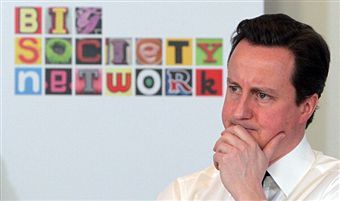 David Cameron is clear that his Big Society is about more than just volunteering. Yet
during the recent spat on the matter, one of the strongest, most frequent criticisms voiced against it was that cutting state spending will lead to fewer volunteers. Dame Elisabeth Hoodless,
executive director of Community Service Volunteers, claimed that the coalition’s spending
cuts risk “destroying the volunteer army”.
David Cameron is clear that his Big Society is about more than just volunteering. Yet
during the recent spat on the matter, one of the strongest, most frequent criticisms voiced against it was that cutting state spending will lead to fewer volunteers. Dame Elisabeth Hoodless,
executive director of Community Service Volunteers, claimed that the coalition’s spending
cuts risk “destroying the volunteer army”.
Johann Hari was also among those making this attack. In the 10 O’Clock Live debate that Fraser blogged last week, he claimed that international evidence tells us that volunteering is highest where public spending is highest. Here’s what he said:
“The biggest international study of volunteering was done by Professor Amitai Etzioni. He found something really important. The state in America that has the highest level of volunteering is Massachusetts, which has the highest level of taxes. The state with the lowest level of volunteering, and the lowest level of co-ops, is Mississippi, which has the lowest level of taxes. The same goes for countries in Europe.”
It’s a fascinating claim – and one that could prove crucial to this debate. If volunteering does indeed go down when state spending is cut, then Cameron has a sizeable hole in his thesis. So, is it true?
We contacted Professor Etzioni, who told us that he had no idea what study Hari was referring to. Hari, it turns out, mis-spoke: he was referring to Robert Putnam, as referenced in a New Statesman article. The source for this was a speech that Liam Byrne made in October 2009 which mentioned Putnam (for whom Ed Miliband worked during his year in Harvard).
We emailed Professor Putnam, who said: “I have, in fact, done some informal work along those lines, and my general finding was that the size of the public sector was basically unrelated, one way or another, to what I called ‘social capital.’” He agreed with Hari in so far as there is no evidence for the “crowding out thesis” – that big government prevents volunteering – and that “social trust and group membership are, if anything, positively correlated with the size of government.” But, he said, “I also don’t know any strong evidence for the opposite ‘crowding in’ argument that Hari makes,” and “the specifics of his claims are novel to me, and in at least one case they are factually false”.
He added, “In volunteering, according to the best evidence from the US Census Bureau, Massachusetts ranks below the national average and is just about on a par with Mississippi. In terms
of actual data, Minnesota (a fairly high tax state and third from the top on volunteering) would support his case, but New York (a very high tax state and second from the bottom on volunteering)
would definitely not.”
Putnam is one of the leading academics in this field, and he says that Hari’s evidence that the Big Society won’t work doesn’t exist. He doesn’t see evidence to support Cameron’s Big Society thesis either, but others – notably German sociologist Isabelle Stadelmann-Steffe and academics at the University of Linz – have recently found international evidence of the state “crowding out” volunteering. So it’s just possible that – in this respect at least – the Big Society has a credible theoretical underpinning.






Comments